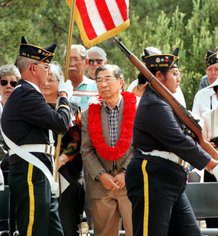
“I felt if I gave in because of the pressures I would lose my own self-respect,” said Hirabayashi, imprisoned when he defied the order for relocation to Japanese internment camps during World War II. “If I lost my self-respect, I would not be a good son, a good citizen. In that sense, I had no choice.”
In 1942, Hirabayashi, a University of Washington senior and the son of a truck farmer, defied a curfew set for those of Japanese descent and refused to board the relocation bus. He spent more than two years in jail; the conviction was finally erased in 1997 when a federal court ruled he was wrongly convicted for resisting internment and curfews aimed at tens of thousands of Japanese Americans.
During the war, 112,000 men, women and children of Japanese descent were forced from their homes along the Pacific Coast and placed in government detention camps in remote locations throughout the West.
Hirabayashi’s parents went. His four brothers and a sister went. But he did not.
With tears in her eyes, his mother begged him to go with them. And Hirabayashi, for a time, thought he’d be on the last bus out of Seattle. But he’d already defied the curfew, “and I asked myself, if I couldn’t cooperate with the curfew, how could I cooperate with this?”
The NPR story also links to this 2000 interview where Mr. Hirabayashi goes into more detail about his decision and has some astonishing moments:
— Hirabayashi was convicted [in 1942] and sentenced to 90 days in prison (plus time already served). Getting there, however, wasn’t as easy as it sounds. He was assigned to a minimum security prison in Arizona, but there was no money to transport him. ‘I asked, Why don’t I go on my own?’ recalls Hirabayashi. The courts agreed to that, and wrote a letter in case he was questioned along the way. ‘I hitchhiked but didn’t realize how hard it would be due to severe gas rationing. It took me more than two weeks to get there, sleeping in ditches along the way and with friends where I had some. Finally, around Las Vegas, I gave up and bought a bus ticket.'”
— “When Hirabayashi arrived at the prison — two weeks late — the staff could not find his papers. They tried to send him home, but Hirabayashi balked at the idea, believing that it could lead to more trouble in the future. ‘They told me to go out for a nice dinner and a movie while they looked for the papers,’ recalls Hirabayashi. ‘So I did. By the time I returned, they’d found the papers.’ ”
— “Did the reversal [of his conviction] change Hirabayashi’s view of the United States? Most definitely, he says. ‘There was a time when I felt that the Constitution failed me,’ he explains. ‘But with the reversal in the courts and in public statements from the government, I feel that our country has proven that the Constitution is worth upholding. The U.S. government admitted it made a mistake. A country that can do that is a strong country. I have more faith and allegiance to the Constitution than I ever had before.’ “
I bolded that last part – I think it’s critical to understand and honor the sentiment that he displayed. It’s important for Muslim Americans to also learn from this example, as we should learn from the example of African Americans and Jews and Catholics and Irish before us, that though the ideals of American freedom may not always be realized in the present, we do have a system that at least provides a mechanism for injustice to be righted and for those ideals to be upheld in the long term.
I firmly believe that the US Constitution does not guarantee our rights – only the consent of our communities does. When there is profound mistrust of a community, the Constitution is silent and powerless to prevent abuse, and even the very institutions of law can turn against the ideals. One need only remember Jim Crow, Prohibition, the PATRIOT Act, and now even the NDAA as examples. But these are over-reactions and impulses that themselves give rise to corrections that are stronger in the direction of liberty overall, and I have the same faith as Mr. Hirabayashi that my nation will emerge from the current dark tunnel of civil liberties under assault, stronger and freer.
On a related note, Mr. Hirabayashi’s story and patriotism are sufficient to utterly refute the horrific and un-American notion that the internment of Japanese-Americans could ever have been justified on national security grounds. Michelle Malkin’s indefensible book defending Japanese-American internment was written as a naked attempt at validating internment someday for Muslims. We must hold fast to the case of Mr. Hirabayashi as inspiration and resolve should we ever as a society get nearer to that awful scenario.
(and for the record, we are nowhere near it yet.)

